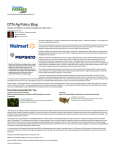EFSA issues barley glucose allergenicity opinion
barley starch following a request from the EC.
"Based on the data provided by the applicant, a review of the scientific literature and clinical information, the panel considers that it is not very likely that barley hydrolysates will cause a severe allergic reaction in the majority of cereal allergic individuals," said the authority. "However, the probability of allergic reactions to barley hydrolysates in barley mono-allergic individuals is unknown." The request for an opinion relates to a submission from Finnsugar, which stated to the EC that glucose syrups based on barley are highly purified products of barley starch and do not contain gluten. The firm presented evidence that barley starch hydrolysates are unlikely, under specific circumstances, to trigger adverse reactions. Directive 2003/89/EC specifies a list of food ingredients or substances that are known to trigger allergic reactions or intolerances in sensitive individuals for which no labelling exemptions are allowed. Whenever the listed ingredients/substances or their derivatives are used in the production of foodstuffs, they must be labelled. Since barley is relevant both as a source of epitopes known to elicit coeliac disease and as an allergen eliciting non-coeliac food allergy, the EC ruled that it was appropriate to assess barley starch hydrolysates for their potential to induce coeliac disease or food allergy. Evidence of non-allergenicity of barley starch hydrolysates included a review of the scientific literature, which did not find any reports on adverse reactions in patients with coeliac disease or cereal allergic individuals linked to barley starch hydrolysates. No amino acids were found in samples of barley starch hydrolysates (detection limit 5-23 mg/kg). ELISA and Western blot immunochemical testing showed values below detection limit (2.4 mg/kg) for nine out of ten samples. A new clinical study on the allergenicity of barley starch hydrolysate in cereal allergic patients was also reported. 15 cereal allergic subjects did not show an allergic reaction during daily consumption of 30 g barley starch hydrolysate for five days. However, the study did not specify clinical reactivity of patients to barley. No further studies have been reported with regard to coeliac disease. "For coeliac disease, in the absence of direct clinical data using barley hydrolysates, assessment of the data submitted indicates that glucose syrups produced from barley starch are unlikely to cause an adverse reaction in individuals with coeliac disease provided that the (provisional) value of gluten considered by Codex Alimentarius for foods rendered gluten-free is not exceeded," said EFSA.



















